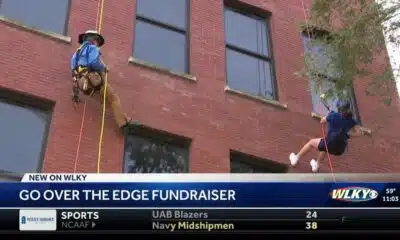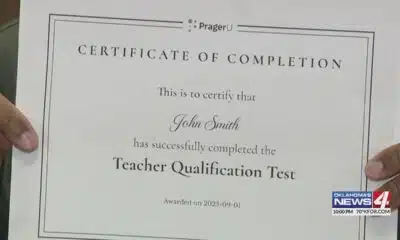News from the South - West Virginia News Feed
Thousands are suing states over sexual abuse in juvenile detention facilities
Thousands are suing states over sexual abuse in juvenile detention facilities
by Amanda Hernández, West Virginia Watch
March 20, 2025
BALTIMORE — Avery Fauntleroy was 16 years old in 2008 when he entered the Charles H. Hickey Jr. School, a juvenile detention center in Maryland.
What was meant to be a place of rehabilitation for him became something far worse.
During his three-month stay for violating the conditions of his home detention order — which was originally issued for riding a motorized dirt bike on public roads — two male correctional staff members sexually abused him at least five times, he says, in both the intake office and the shower room.
Within the first few weeks of his stay, he was placed on something called a one-to-one — a form of suicide watch that required at least one officer to be with him at all times.
“The thing that was supposed to protect me the most was actually the thing I felt like hurt me the most,” Fauntleroy said.
He repeatedly reported the abuse to his in-facility therapist, but nothing came of it, he said.
“You start to notice that things seem more aggressive the more you say, so you just tend to not say anything,” Fauntleroy said. “I just put my head down, just kind of took what was going on.”
Now 33, he continues to grapple with the lasting impact of the abuse — something that has seeped into every aspect of his life, including his relationships with his children.
As he got older, he eventually revealed the truth to his mother and brother, who encouraged him to speak out.
“You’re in the facility because you’ve done something that clearly wasn’t good,” Fauntleroy said in an interview, “but that doesn’t give anyone the right … to do what they want to do with you.”
Fauntleroy is among the thousands of people suing Maryland under the Child Victims Act, a 2023 law that lifted the 20-year statute of limitations on lawsuits against public and private entities — including schools, religious institutions and local or state agencies — involving incidents of sexual abuse.
Survivors can seek damages against state and local governments of up to $890,000 for each occurrence of abuse. The cap is higher for cases against private institutions, at $1.5 million.
Since the law took effect, more than 3,500 people have filed lawsuits against Maryland state agencies, many alleging abuse in the state’s juvenile detention facilities. The state is negotiating settlements outside of court, but there are at least 29 additional pending complaints, which include hundreds more plaintiffs, across various courts in the state.
In recent years, lawsuits alleging sexual or physical abuse by juvenile correctional officers and other detention center staff have emerged in more than a dozen states, including California, Georgia, Illinois, Kansas, Louisiana, Michigan, New Hampshire, New Jersey, New York, Oregon, Pennsylvania, Tennessee and Washington.
Between 2000 and 2015, recurring abuse was documented in state-funded juvenile detention facilities in 29 states and the District of Columbia, according to a March 2023 report by The Sentencing Project, a research and criminal justice advocacy group.
In early March, 30 officers at a California juvenile detention facility were charged with child abuse and endangerment for allegedly allowing fighting or orchestrating “gladiator fights” between detainees as young as 12 and as old as 18.
Just last week, Oregon Democratic Gov. Tina Kotek fired the longtime director of the Oregon Youth Authority as the agency faced scrutiny over a backlog of mishandled abuse reports. And 10 men filed a lawsuit alleging they were sexually abused as boys in a state juvenile center.
Changes in state laws have paved the way for many of the new lawsuits across the country.
The nonprofit Child USA, which tracks child victim laws nationwide, found that more than a dozen states have changed their laws since 2020 to give survivors more time to sue. This year, legislatures in at least 15 states are considering bills that would expand the statute of limitations on child sex abuse cases, according to Child USA’s tracker.
In Maryland, though, some lawmakers have grown alarmed at the potential fallout.
A court filing in early March requesting an extension in a case before the Baltimore County Circuit Court noted that an additional 4,000 or more claimants may file similar suits against the state in the future.
The Maryland Attorney General’s Office, which is representing the state in most of the lawsuits against it, and the state Department of Juvenile Services declined Stateline’s interview requests.
But the growing number of lawsuits is forcing Maryland legislators to reconsider aspects of the sweeping law. Democratic Del. C.T. Wilson, the architect of the Child Victims Act, proposed changes that could cap damages and clarify how abuse claims are defined.
This is potentially an enormous liability for the state.
– David Romans, Maryland legislative budget analyst, in committee testimony
Wilson’s office declined Stateline’s interview request and did not respond to emailed questions seeking to confirm his legislative proposals.
State officials have said the financial consequences of the lawsuits could be devastating for the state, which faces a $3 billion budget gap for fiscal year 2026.
“This is potentially an enormous liability for the state,” David Romans, a legislative budget analyst, told the House Appropriations and Senate Budget and Taxation committees in January.
He told lawmakers that some of the alleged cases of abuse in Maryland’s juvenile detention facilities date back as far as the 1960s.
Rampant abuse across the states
It can take decades for a survivor of childhood sexual abuse to come forward. While this timeline varies from person to person, research suggests that the abuser’s social standing often plays a significant role.
Survivors who were abused by people in positions of authority such as clergy, educators and law enforcement — including correctional officers — may be even more reluctant to share their stories.
“[Survivors] have told me they are taking it to their grave. They’re not going to tell anybody,” David Lorenz, the Maryland director of the Survivors Network of those Abused by Priests, said in an interview with Stateline. Lorenz, who advocated for the Child Victims Act, had worked on different versions of the bill for at least 20 years.
Experts say juvenile facilities can be dangerous for children and often lack the oversight mechanisms found in some adult correctional institutions.
“There’s just a real lack of transparency about what’s happening inside those facilities,” said Michele Deitch, the director of the Prison and Jail Innovation Lab at the University of Texas at Austin, which runs the National Resource Center for Correctional Oversight.
“Many of these kids have had real trauma in their lives before they’ve ever gone into these facilities,” she added. “That, in many ways, makes them much more vulnerable to abuse by others, and much less likely to be able to advocate for themselves.”
When Avery Fauntleroy left the juvenile detention facility, at 16, he didn’t tell anyone what had happened. He was just relieved to be outside.
The thing that was supposed to protect me the most was actually the thing I felt like hurt me the most.
– Avery Fauntleroy, sexual abuse survivor
He recalled becoming quieter and less of a people person. He no longer liked physical touch, especially from other men in his life.
He let people believe he had simply toughened up from his time in the facility.
The Charles H. Hickey Jr. School in Baltimore County is facing abuse allegations, most recently from 2019, from more than 500 men and women in at least two separate lawsuits.
While the facility now exclusively detains boys, it has previously housed girls as well. In an online information sheet, the facility says that all its staff are trained in trauma-informed care and that detainees have access to crisis counseling, substance use education and various programs, including life skills development, pet therapy and a book club.
One of the lawsuits against the facility alleges that Ronald P. Neverdon, a former staff member who held roles such as unit manager and housing supervisor from the mid-1960s to the mid-1990s, abused children at the facility and other locations.
According to the suit, Neverdon groomed victims by offering them special privileges, money, drugs and expensive gifts while using his authority to silence them with threats of punishment if they reported the abuse. The Baltimore Sun reported that Neverdon also served as a substitute teacher in Baltimore City Public Schools, most recently in 2020.
Stateline was unable to reach Neverdon for response, and it’s unclear whether he has an attorney. He has not been charged with a crime.
“These kids were subjected to just horrific, horrific sexual violence,” said Alexandra Walsh, one of the attorneys working on child sex abuse cases across the state, in an interview with Stateline. “This has been dragging on too long, and it’s not fair to the people who were so grievously harmed.”
Maryland’s Department of Juvenile Services said in a statement that it takes the allegations from across the state “with utmost seriousness and we are working hard to provide decent, humane and rehabilitative environments for youth committed to the Department.”
Possible legislative changes
Maryland lawmakers may consider legislative changes that could limit financial liability for the state in cases under the Child Victims Act — a move that has sparked debate among advocates and policymakers.
One proposal would lower the cap on damages for survivors who file claims after a certain date. Currently, victims can seek up to $890,000 in claims against state or local governments, but the proposal would reduce that cap to $400,000, aligning it with the maximum allowed under the Maryland Tort Claims Act.
Another proposed change would define repeated abuse by the same perpetrator as a single “occurrence” under the law. This change would limit victims to receiving a maximum of $890,000 in total, rather than for each instance of abuse.
Although those proposals were not introduced during this year’s legislative session, Del. Wilson, the Child Victims Act’s architect, did introduce a bill to prevent new filings under the law against the state after Jan. 1, 2026.
That bill had its committee hearings canceled at least four times since mid-February. The Baltimore Banner reported in early March that Wilson had vowed he would not close the window for claims and that this bill was a placeholder ahead of the deadline for filing new bills.
Since the bill did not receive a committee hearing or a vote, it is unlikely to pass this session. The issue may still resurface during next year’s legislative session.
Some advocates are torn over the potential changes to the law.
One of the primary goals of Maryland’s Child Victims Act was to publicly identify abusers and the institutions that protected them, said Lorenz, the survivors advocate who helped draft the law. It will still accomplish that goal, he said, even if the proposed changes are adopted.
While victims may still receive justice, it may not be to the full extent they deserve if the proposed changes are adopted, he said. But Lorenz also understands that the state may need to revise the law because the state funds other programs designed to help residents.
“My heart goes out to them,” Lorenz said. “If they lower the limit, unfortunately, it’s going to send a message to survivors that they’re not worth as much as everybody else.”
For survivor Avery Fauntleroy, the fight is about more than money. It’s about confronting the past and uncovering what really happened during his time at the Charles H. Hickey Jr. School.
“They can’t give me a number that’s going to fix everything,” he said. “Maybe me doing this will make someone else want to speak up, or make them want to give their story and not hide behind anything.”
Stateline reporter Amanda Hernández can be reached at ahernandez@stateline.org.
GET THE MORNING HEADLINES.
West Virginia Watch is part of States Newsroom, a nonprofit news network supported by grants and a coalition of donors as a 501c(3) public charity. West Virginia Watch maintains editorial independence. Contact Editor Leann Ray for questions: info@westvirginiawatch.com.
The post Thousands are suing states over sexual abuse in juvenile detention facilities appeared first on westvirginiawatch.com
News from the South - West Virginia News Feed
National Grandparents Day (9-7-25) and the special bond shared with their grandchildren
SUMMARY: This Sunday, September 7th, is National Grandparents Day, honoring the special bond between grandparents and grandchildren. In Milton State, many grandparents become primary caregivers due to their children’s substance abuse disorders. Presley Ridge highlights the vital role grandparents play in foster care, offering training and support to become certified foster parents. West Virginia leads the nation in child removals, resulting in many grandparents raising grandchildren full-time. Services aim to reunify families by supporting parents’ recovery. Children thrive better in familiar grandparent homes, providing love and stability. Senator Brian Hilton emphasizes improving treatment programs to help families heal and support grandparents effectively.
National Grandparents Day is a time to appreciate the joy and wisdom they bring to our lives. Mountain State grandparents often take on another role, stepping in to become primary caregivers when their children have substance abuse issues.
~ Newswatch reporter Jillian Risberg (https://www.facebook.com/JillianRisTV) found out how much love, guidance, and stability grandparents can provide.
FOLLOW US ON FACEBOOK AND TWITTER:
https://facebook.com/WOAYNewsWatch
https://twitter.com/WOAYNewsWatch
News from the South - West Virginia News Feed
WV Supreme Court will hear BOE’s appeal in vaccine lawsuit — but not right away
by Lori Kersey, West Virginia Watch
September 5, 2025
West Virginia’s highest court will take on a legal battle over the state’s school vaccination requirements, but it denied a request by state school officials that it do so quickly.
The state Supreme Court on Thursday set a deadline of Dec. 12 for the West Virginia Board of Education to prepare its appeal of a Raleigh County judge’s July ruling against it. That ruling was in regards to a lawsuit brought by three Raleigh County families over the board’s refusal to accept religious exemptions to the state’s mandatory school vaccine requirements.
Raleigh County Circuit Judge Michael Froble in July granted a preliminary injunction in the case that allows students in the case to attend class with a religious exemption to the vaccination requirements.
The school board had filed notice of appeal and asked the high court to both expedite a review of the appeal and temporarily halt the proceedings in the lower court.
In the scheduling order Thursday, the court denied both motions. Justices also set a deadline of Jan. 26 for the plaintiffs in the case to respond to the board’s appeal. The board will then have until Feb. 16, 2026 to write a reply, if necessary.
After the Feb. 16 reply brief deadline, the court writes, the appeal will be ready for review.
The Raleigh lawsuit is one case in a legal battle over religious freedom and the state’s strict school vaccination requirements. Every state requires school students to be vaccinated against a number of infectious diseases including polio, chicken pox and measles. Florida officials announced this week plans to eliminate its vaccine mandates.
West Virginia has been one of only five states that have not allowed students to opt out of the shots because of their religious or philosophical objections to them.
West Virginia Gov. Patrick Morrisey issued an executive order on his second day in office requiring the state to allow religious exemptions. His order is based on the 2023 Equal Protection for Religion Act. He argues that the religious freedom law, when read alongside the vaccination law, calls for the religious exemptions.
Morrisey has not rescinded that executive order, even though the state Legislature earlier this year rejected a bill that would have established those religious exemptions in state code.
Raleigh County Circuit Judge Michael Froble has scheduled a two-day hearing next week on a permanent injunction in the lawsuit, which he recently consolidated with a lawsuit brought against the state health department by two parents of immunocompromised students over its issuance of religious exemptions. Plaintiffs in that case are represented by the ACLU of West Virginia and Mountain State Justice.
The hearing is set for Sept. 10 and 11 at the Raleigh County Judicial Center. During that hearing, the judge has said he wants to consider issues that include whether the state’s vaccination law is constitutional without religious exemptions and the authority of Morrisey’s executive order.
YOU MAKE OUR WORK POSSIBLE.
West Virginia Watch is part of States Newsroom, a nonprofit news network supported by grants and a coalition of donors as a 501c(3) public charity. West Virginia Watch maintains editorial independence. Contact Editor Leann Ray for questions: info@westvirginiawatch.com.
The post WV Supreme Court will hear BOE’s appeal in vaccine lawsuit — but not right away appeared first on westvirginiawatch.com
Note: The following A.I. based commentary is not part of the original article, reproduced above, but is offered in the hopes that it will promote greater media literacy and critical thinking, by making any potential bias more visible to the reader –Staff Editor.
Political Bias Rating: Centrist
The content presents a factual and balanced overview of the legal dispute surrounding vaccine exemptions in West Virginia without evident partisan language or framing. It reports on actions taken by government officials, court decisions, and ongoing lawsuits from multiple perspectives, including those of the state board, families, and advocacy groups. The neutral tone and focus on legal developments suggest a centrist approach, aiming to inform rather than persuade toward a particular political viewpoint.
News from the South - West Virginia News Feed
Christian’s Morning Forecast: Strong to Severe Storms Incoming
SUMMARY: Storm Watch meteorologist Christian Boler reports strong to severe storms approaching West Virginia, especially McDow, Tazewell, and Wyoming counties during the morning commute. Temperatures will remain in the upper 60s to low 70s with southwest winds around 5-10 mph. A marginal severe weather threat exists across the region, mainly involving winds and flooding, but no tornadoes or hail expected. Rainfall of a quarter to half an inch is likely over 48 hours with isolated downpours. Storms will arrive in two waves before clearing Friday. Another front may bring showers Saturday, but high pressure will clear skies for the weekend and beyond.
FOLLOW US ON FACEBOOK AND TWITTER:
https://facebook.com/WOAYNewsWatch
https://twitter.com/WOAYNewsWatch
-
Mississippi Today5 days ago
Trump proposed getting rid of FEMA, but his review council seems focused on reforming the agency
-
News from the South - Louisiana News Feed7 days ago
‘They broke us down’: New Orleans teachers, fired after Katrina, reflect on lives upended
-
News from the South - Tennessee News Feed5 days ago
Tennessee ranks near the top for ICE arrests
-
News from the South - Missouri News Feed6 days ago
Missouri joins dozens of states in eliminating ‘luxury’ tax on diapers, period products
-
News from the South - Alabama News Feed7 days ago
Alabama union leaders say they’re fighting for the state’s middle class
-
News from the South - North Carolina News Feed7 days ago
NC Labor Day 2025: A state that’s best for business is also ranked worst for workers
-
News from the South - Texas News Feed3 days ago
Texas high school football scores for Thursday, Sept. 4
-
News from the South - Oklahoma News Feed6 days ago
Test taker finds it's impossible to fail 'woke' teacher assessment











































